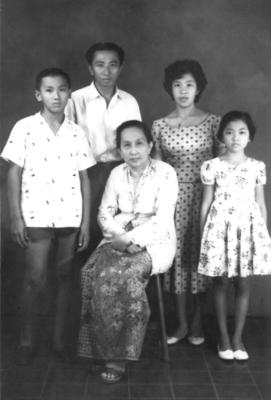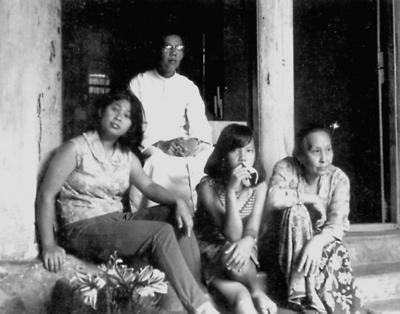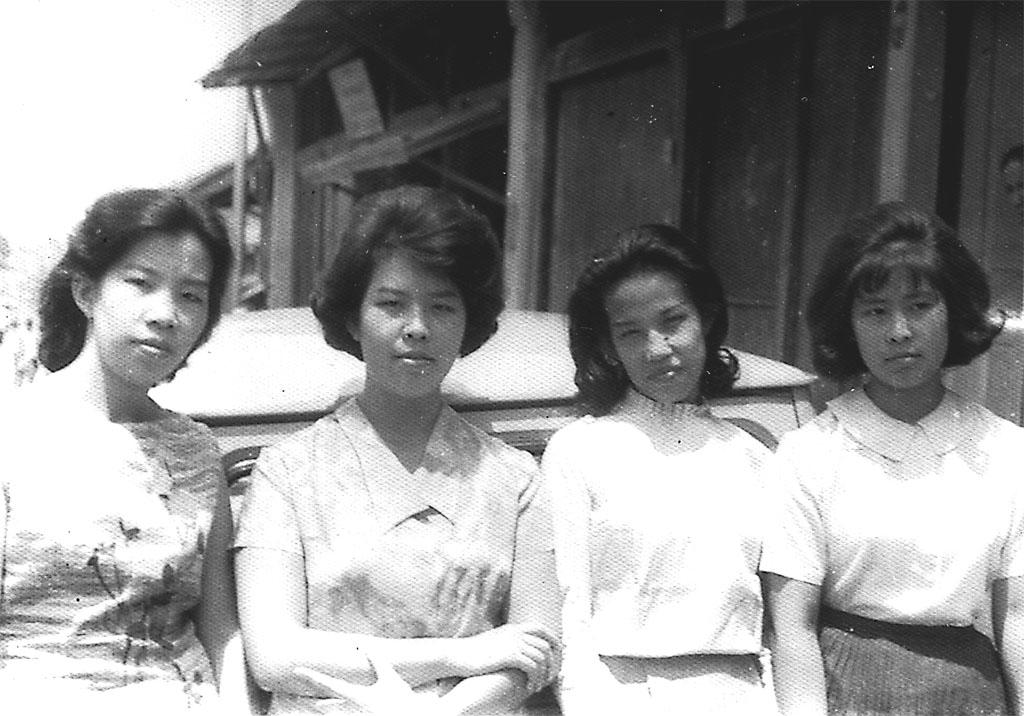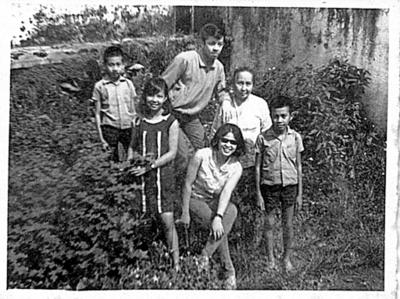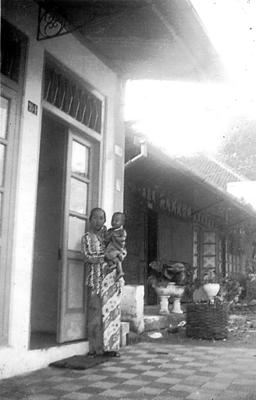I found this picture on ebay. Someone in Netherlands sells this collectible postcard. The fifth house on the right is my grandparents' house where I grew up
Lee's family photo album
Monday, June 18, 2012
Cimahi 1920s, Pasar Atas street
I found this picture on ebay. Someone in Netherlands sells this collectible postcard. The fifth house on the right is my grandparents' house where I grew up
Sunday, November 11, 2007
Love of pets and and old cars
Most of men in my dad's family loved old cars and pets. Two of dad's sons and several of their cousins were self taught mechanics, like dad himself and encek Engtun. At Pasir Gombong, along with the Plymouth, there used to be a WWII era motorcycle dad used to ride around. Encek Eng Tek rode an old Mercedez, similar to encek Eng Liang's, while encek Eng Tun used to came there with his Australian Holden.
But for pets, dad only loved singing birds, not the dogs, specially not the fishes. He even didn't like to eat fish. As for exotic pets, no one can top dad's, even encek Eng Giok's peacocks. One day at Pasir Gombong, to everyone's surprise including mom's, dad brought a 9 month old orang utan named Betty. She was an affectionate little ape, specially to dad, but not to kid like me. When I tried to play with her, she would pull my hand from her cage and wouldn't let go until an adult came and free me. Betty only stayed several months with us, because later on dad learned that orang utan was an endangered species, prohibited to be kept as pet.
But for pets, dad only loved singing birds, not the dogs, specially not the fishes. He even didn't like to eat fish. As for exotic pets, no one can top dad's, even encek Eng Giok's peacocks. One day at Pasir Gombong, to everyone's surprise including mom's, dad brought a 9 month old orang utan named Betty. She was an affectionate little ape, specially to dad, but not to kid like me. When I tried to play with her, she would pull my hand from her cage and wouldn't let go until an adult came and free me. Betty only stayed several months with us, because later on dad learned that orang utan was an endangered species, prohibited to be kept as pet.
Saturday, November 10, 2007
Road trips
I remember one day we're riding the 20+ years old black Plymouth to Cimahi. This American car had steering wheel on the left side, while the road was for right-handed cars (British style). Mom was the co-pilot while dad's driving. Her assistances were really needed to check the cars on the opposite direction when we have to passed slow moving cars on the narrow and winding two lanes road. We crossed the wide Citarum river on its yellow-arched steel bridge, then Gunung Masigit region, a mountainous area where the lime stones were mined. The mountains were lush green with some lime stone white slopes. The slow moving trucks hauling lime stones were the regular obstacles there.
Lisa, Etih and I sat on the Plymouth's back that day, and Lisa was leaning over the rusted doors. When the car took a curve, to everyone surprise the door swung open. It was a moment of horror. If it's not for Etih's fast reflex, she would've been thrown out of the car.
After that incident, we rarely used the car anymore. Mom told us one night dad drove us from Cimahi, but dad was so tired and sleepy, so he pulled over somewhere along the way, thinking we're already arrived. Luckily a nice police man were patrolling on his bicycle, and he helped us drove the car home.
The car's tires didn't have any visible threads anymore, so dad couldn't drive it to Jakarta, because there were laws banning such old cars in the country's capital.
Unlike Lisa, who couldn't take long road trips without vomiting in the car, I was much hardier and quieter kid, so my parents used to took me alone when visiting relatives. One dawn before new year, my dad and I hitched a ride on a rice truck, then we took a public bus to his mom's place in Jakarta for new year party, which also happens to be grandma's birthday. The journey took over 8 hours, with many stops, taking on any new passengers waving on the side of the road, or dropping them off anywhere along the road. We stopped on the bus terminal at Cianjur, where the hawkers jumped on the bus, selling peanut, tofu, or cigarettes. At Cipanas the bus stopped at Roda, a Padang restaurant where almost everyone get off for supper. We didn't get off, as usual my dad snoozed on and off through journey. He told me to look for the big billboard sign near my grandma's house, which of course I missed. Next time he woke up, we already few km away, so have to go back on an oplet, small car with varnished plywood sides (Morris or Opel) converted to be used as public minibus. Later on I learned which city along the road from the type of public transportation on the street. Bogor has "bemo", a funny looking car converted from Vespa scooter. It has three wheels, Vespa scooter steering handle, and two row of side facing passenger seats that could crammed 6 adults. Jakarta has the oplet, and "Helicak", another funny looking vehicle. I guess the name came from helicopter and "becak" (man powered three wheel rickshaw). The helicak is a motorized becak with passenger cabin styled like a helicopter.
Grandma's house, on an area called kampung Makasar, somewhere between Jakarta and Bogor, belonged to my uncle encek Eng Giok. Only my grandma and my auntie, oh (fraternal younger auntie) Mit lived there, while encek Eng Giok lived in the city with his family. It was a big house with many dogs, which I called sheep at the beginning, because I never saw a dog in my whole life. There were also a pair of beautiful peacock. They could detect visitors at the front gate and made a loud cry, much earlier before the dogs barked. Grandma taught me to feed them raw chilies grown on the yard. On the front yard there are some old cars, a fishing boat, and a gold fish pond.
Lisa, Etih and I sat on the Plymouth's back that day, and Lisa was leaning over the rusted doors. When the car took a curve, to everyone surprise the door swung open. It was a moment of horror. If it's not for Etih's fast reflex, she would've been thrown out of the car.
After that incident, we rarely used the car anymore. Mom told us one night dad drove us from Cimahi, but dad was so tired and sleepy, so he pulled over somewhere along the way, thinking we're already arrived. Luckily a nice police man were patrolling on his bicycle, and he helped us drove the car home.
The car's tires didn't have any visible threads anymore, so dad couldn't drive it to Jakarta, because there were laws banning such old cars in the country's capital.
Unlike Lisa, who couldn't take long road trips without vomiting in the car, I was much hardier and quieter kid, so my parents used to took me alone when visiting relatives. One dawn before new year, my dad and I hitched a ride on a rice truck, then we took a public bus to his mom's place in Jakarta for new year party, which also happens to be grandma's birthday. The journey took over 8 hours, with many stops, taking on any new passengers waving on the side of the road, or dropping them off anywhere along the road. We stopped on the bus terminal at Cianjur, where the hawkers jumped on the bus, selling peanut, tofu, or cigarettes. At Cipanas the bus stopped at Roda, a Padang restaurant where almost everyone get off for supper. We didn't get off, as usual my dad snoozed on and off through journey. He told me to look for the big billboard sign near my grandma's house, which of course I missed. Next time he woke up, we already few km away, so have to go back on an oplet, small car with varnished plywood sides (Morris or Opel) converted to be used as public minibus. Later on I learned which city along the road from the type of public transportation on the street. Bogor has "bemo", a funny looking car converted from Vespa scooter. It has three wheels, Vespa scooter steering handle, and two row of side facing passenger seats that could crammed 6 adults. Jakarta has the oplet, and "Helicak", another funny looking vehicle. I guess the name came from helicopter and "becak" (man powered three wheel rickshaw). The helicak is a motorized becak with passenger cabin styled like a helicopter.
Grandma's house, on an area called kampung Makasar, somewhere between Jakarta and Bogor, belonged to my uncle encek Eng Giok. Only my grandma and my auntie, oh (fraternal younger auntie) Mit lived there, while encek Eng Giok lived in the city with his family. It was a big house with many dogs, which I called sheep at the beginning, because I never saw a dog in my whole life. There were also a pair of beautiful peacock. They could detect visitors at the front gate and made a loud cry, much earlier before the dogs barked. Grandma taught me to feed them raw chilies grown on the yard. On the front yard there are some old cars, a fishing boat, and a gold fish pond.
Wednesday, November 07, 2007
Pasir Gombong, my earliest memories
It was early 1970's at Pasir Gombong rice mill, Cipeuyeum vilage, my birth place. I could remember when I was 3 or 4. My parents lived there with my 1 year older sister Lisa. Ruthje, my 6 years older sister, was staying in Jakarta with her grandma and auntie from my dad's family, so she can go to decent school there. There should be a public school nearby where the local kids went, but I think it was not up to my parent's expectation, as they grew up in well off Chinese-Indonesian family where better private school was preferred.
The place was a 1900's Chinese-Dutch colonial relic rice mill, where the local farmers used the service to process the rice from padi (rice weeds) to beras (rice grains).
On the left of the dirt road was the front main gate made of chain link. To the right was a small river and a piece of land full of wild bushes and fruit trees. From jamblang, the sweet sour purple fruit the size of a thumb, to kedongdong, the green-yellow sweet fruit with bristle brush-like seed inside. There were also a lot of poisonous snakes. The river separates our house from those snakes, but from time to time some of them managed to swim over for a visit. My parent used to smack those unexpected wanderers with 1.5 meter black wooden stick, and my mom told us that she even saw a cobra one day.
To the left of the gate was the garage for an old black Plymouth, the car my dad used to drove us to other cities on the good days when it allows its engine to run. Behind the garage there was a typical Sundanese village bamboo house. It was mang (uncle in Sundanese) Azhari's house, the keeper. His wife, we called her Umi (mom in Arabic). They have 5 or 6 children. 1 or 2 older boys (I don't recall their names), 2 younger sisters, Kayah and Etih, used to work as our nannies from time to time, and a girl (forgot her name too) and a boy, Kurnia, which was about my age and my sister Lisa.
In front of their house there was a "kulah", a large pond, where their whole family would took bath on open air. Next to the pond was an outbuilding, the "kantor" (office), where my uncle and others would conduct their business. It had 2 teak desks and a set of chairs, and has a small booth opening, where the mill's worker would collect their wages daily. Across the office was our house, a Dutch styled mason house with terracotta tiled roof. In front and on the side of the house were 2 large yards separated by the dirt road to the mill. The yards were paved with concrete, where the workers used to dried the rice under the sun. Behind one of the yard was the mill, a huge building with corrugated iron roof and some old Dutch machinery to process the rice.
Across the largest concrete fields was a field with sugar cane, coconut, cassava, mango, star fruit, jambu trees, also a large fish pond and some hen houses with occasional occupants of chicken, duck, geese, swan, and turkey. During rice harvest season, the place always filled with the pollen from the mill that makes your skin itch, but it was our bowl of rice.
Behind the mill was the diesel generator house, the only electricity source for the house, which only started at 6 pm to 6 am. On the quiet evening when the sun start to set, the sound of the generator gradually started brought light was my favorite sound. One day the generator broke down for couple of days. During those nights, we used kerosene lantern. In the morning all of our nose's insides were black from the lantern's smokes.
The mill used to be own by my dad's uncle, but sold to another person when I lived there, runs by his brothers, encek (younger fraternal uncle in Chinese dialect) Eng Tek, used to be the director, encek Eng Liang, who took over the director's job, encek Eng Tun, the part time mechanic, my dad, the all purpose person, and 2 other guys of his family members, engku (younger maternal uncle) Cun, Empek (older fraternal uncle) Bem. Some of these names was somehow adopted by the employees to their liking. They refer to the director as neng (Sundanese referral to someone in higher social cast or employer, as it was impolite to refer someone older or such with their names directly) Kawasa (Sundanese for authority). As for engku Cun, he was referred as neng Engku. My mom was referred as neng Istri (wife in Sundanese). The exception was only for my dad, who insist to be called as pak (normal Indonesian referral for older man) Jaka, from his Indonesian name Zakaria, instead of his Chinese name Eng Siang. My dad and us lived in this house, and engku Cun also lived on the "loteng" (2'nd floor). The rest commuted daily from Cianjur or Jakarta.
There are dozens of men and women worked at the mill. I could recall only some of them by names. There were mang Salim, the most trusted person in the family, used to fetch water from the well for our bath and play kecapi (Sundanese harp) when my dad played the violin, mang Kateng, the mandor (foreman), and bi (Sundanese for auntie) Amah, the fair-skinned lady who used to nurse me and Lisa. I even remember for some reason she used breastfed us when mom was not around.
It's a long walk on dirt country road from this place to the main road. The only clue to detour from the main road to Pasir Gombong's road is the railway crossroad, next to Cipeuyeum train stop. It's approximately halfway between Cimahi and Cianjur. I was told the dirt road leads to Bojong Picung village, and could eventually ends up at some mountains or seashores on south of Java island. We never had a chance to took the daily public train when we lived there. The train was the less popular means of transportation due to its less frequent and never on-time schedules, compare to the public buses which picked up passenger where ever they found ones along the main road. We used to hitch a ride on public bus to Cimahi in the east, where my mom's family lived, or to nearest city Cianjur in the west, where Lisa took kindergarten. She told me she used to take a shortcut through the rice fields with dad or Etih. It was a shorter journey, but you'll end up with a lot of dirt and rice weeds all over your clothes. Unlike her, I didn't take kindergarten, instead mom taught us to read at home. Thanks to the homeschooling, I could read at age of 5, although always struggle with my ugly handwriting.
The place was a 1900's Chinese-Dutch colonial relic rice mill, where the local farmers used the service to process the rice from padi (rice weeds) to beras (rice grains).
On the left of the dirt road was the front main gate made of chain link. To the right was a small river and a piece of land full of wild bushes and fruit trees. From jamblang, the sweet sour purple fruit the size of a thumb, to kedongdong, the green-yellow sweet fruit with bristle brush-like seed inside. There were also a lot of poisonous snakes. The river separates our house from those snakes, but from time to time some of them managed to swim over for a visit. My parent used to smack those unexpected wanderers with 1.5 meter black wooden stick, and my mom told us that she even saw a cobra one day.
To the left of the gate was the garage for an old black Plymouth, the car my dad used to drove us to other cities on the good days when it allows its engine to run. Behind the garage there was a typical Sundanese village bamboo house. It was mang (uncle in Sundanese) Azhari's house, the keeper. His wife, we called her Umi (mom in Arabic). They have 5 or 6 children. 1 or 2 older boys (I don't recall their names), 2 younger sisters, Kayah and Etih, used to work as our nannies from time to time, and a girl (forgot her name too) and a boy, Kurnia, which was about my age and my sister Lisa.
In front of their house there was a "kulah", a large pond, where their whole family would took bath on open air. Next to the pond was an outbuilding, the "kantor" (office), where my uncle and others would conduct their business. It had 2 teak desks and a set of chairs, and has a small booth opening, where the mill's worker would collect their wages daily. Across the office was our house, a Dutch styled mason house with terracotta tiled roof. In front and on the side of the house were 2 large yards separated by the dirt road to the mill. The yards were paved with concrete, where the workers used to dried the rice under the sun. Behind one of the yard was the mill, a huge building with corrugated iron roof and some old Dutch machinery to process the rice.
Across the largest concrete fields was a field with sugar cane, coconut, cassava, mango, star fruit, jambu trees, also a large fish pond and some hen houses with occasional occupants of chicken, duck, geese, swan, and turkey. During rice harvest season, the place always filled with the pollen from the mill that makes your skin itch, but it was our bowl of rice.
Behind the mill was the diesel generator house, the only electricity source for the house, which only started at 6 pm to 6 am. On the quiet evening when the sun start to set, the sound of the generator gradually started brought light was my favorite sound. One day the generator broke down for couple of days. During those nights, we used kerosene lantern. In the morning all of our nose's insides were black from the lantern's smokes.
The mill used to be own by my dad's uncle, but sold to another person when I lived there, runs by his brothers, encek (younger fraternal uncle in Chinese dialect) Eng Tek, used to be the director, encek Eng Liang, who took over the director's job, encek Eng Tun, the part time mechanic, my dad, the all purpose person, and 2 other guys of his family members, engku (younger maternal uncle) Cun, Empek (older fraternal uncle) Bem. Some of these names was somehow adopted by the employees to their liking. They refer to the director as neng (Sundanese referral to someone in higher social cast or employer, as it was impolite to refer someone older or such with their names directly) Kawasa (Sundanese for authority). As for engku Cun, he was referred as neng Engku. My mom was referred as neng Istri (wife in Sundanese). The exception was only for my dad, who insist to be called as pak (normal Indonesian referral for older man) Jaka, from his Indonesian name Zakaria, instead of his Chinese name Eng Siang. My dad and us lived in this house, and engku Cun also lived on the "loteng" (2'nd floor). The rest commuted daily from Cianjur or Jakarta.
There are dozens of men and women worked at the mill. I could recall only some of them by names. There were mang Salim, the most trusted person in the family, used to fetch water from the well for our bath and play kecapi (Sundanese harp) when my dad played the violin, mang Kateng, the mandor (foreman), and bi (Sundanese for auntie) Amah, the fair-skinned lady who used to nurse me and Lisa. I even remember for some reason she used breastfed us when mom was not around.
It's a long walk on dirt country road from this place to the main road. The only clue to detour from the main road to Pasir Gombong's road is the railway crossroad, next to Cipeuyeum train stop. It's approximately halfway between Cimahi and Cianjur. I was told the dirt road leads to Bojong Picung village, and could eventually ends up at some mountains or seashores on south of Java island. We never had a chance to took the daily public train when we lived there. The train was the less popular means of transportation due to its less frequent and never on-time schedules, compare to the public buses which picked up passenger where ever they found ones along the main road. We used to hitch a ride on public bus to Cimahi in the east, where my mom's family lived, or to nearest city Cianjur in the west, where Lisa took kindergarten. She told me she used to take a shortcut through the rice fields with dad or Etih. It was a shorter journey, but you'll end up with a lot of dirt and rice weeds all over your clothes. Unlike her, I didn't take kindergarten, instead mom taught us to read at home. Thanks to the homeschooling, I could read at age of 5, although always struggle with my ugly handwriting.
Monday, August 29, 2005
Christmas at Pasar Atas
Pasir Gombong, April 1969
Saturday, August 27, 2005
The Rice Mill
Friday, August 26, 2005
Pasar Atas backyard
Nanny
Bogor 1940

Lee's family, Bogor botanical parc, 10 July 1940
From the left, aunt Corry, aunt Harry, aunt Bogor, great granma, uncle Sun Dri, great granpa, uncle Sun Bie, granpa, uncle Sun Pam, granma. Aunt Gin, who showed me this photo, was born but not on the picture as she was adopted in an old Chinese tradition by granpa's uncle. My mother was in granma's womb at the time this photo was taken.
Subscribe to:
Posts (Atom)








